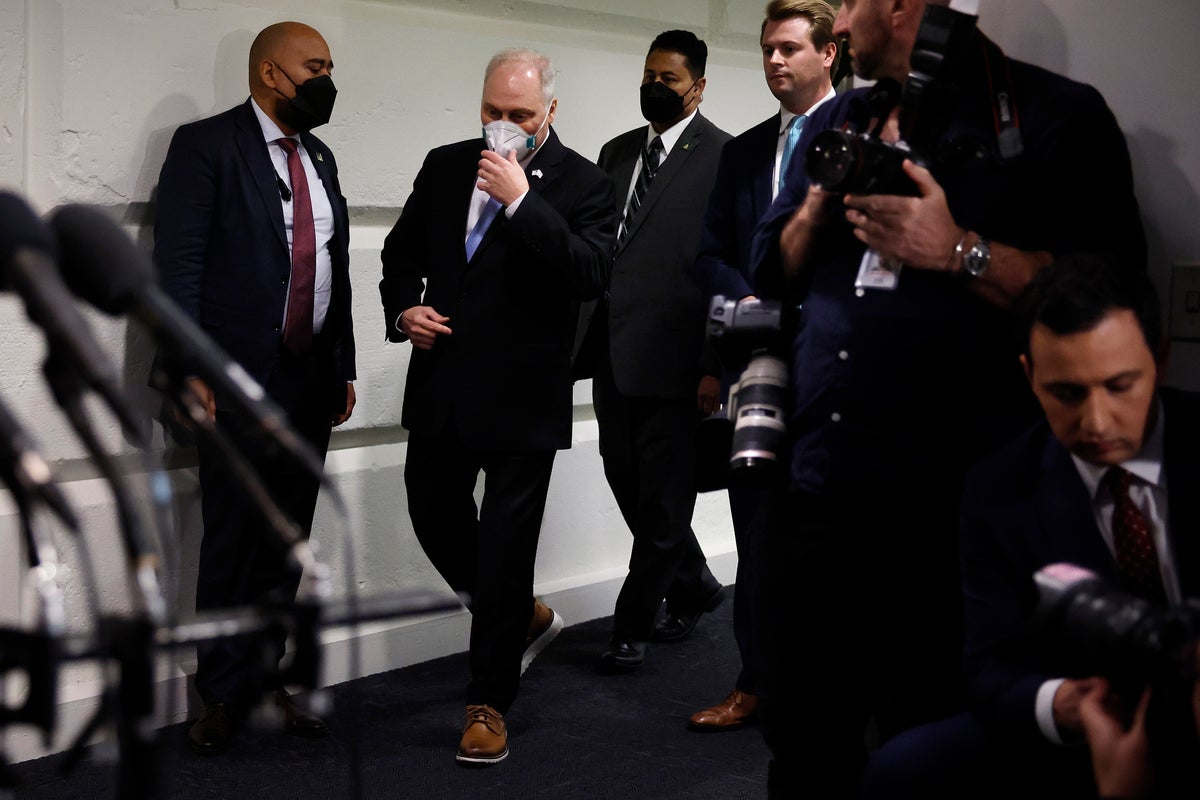Steve Scalise fails to secure enough votes for house speaker


House Majority Leader Steve Scalise withdrew his name from the running to become speaker of the House of Representatives after he failed to secure enough votes.
Mr Scalise’s decision came after he had failed to convince 217 of the 221 members of the House Republican conference required to win the gavel to vote for him for speaker.
“If you look at where our conference is, there’s still work to be done,” he said. “Our conference still has to come together. And it’s not there.”
The House Republican conference had nominated Mr Scalise on Wednesday to replace former speaker Kevin McCarthy after an hours-long session. Mr Scalise beat out Rep Jim Jordan (R-OH), a hardliner conservative whom former preisdent Donald Trump endorsed.
But many Republicans criticised the process and many who supported Mr Jordan continued to back him.
“There are still some people that have their own agendas,” he said. “And I was very clear we have to have everybody put their agendas on the side and focus on what this country needs this country is counting on us to come back together.”
Earlier in the day, House Republicans met in the basement of the US Capitol and tried to allow members to air their differences before they went to the floor to vote. But Mr Scalise got no futher with winning over some of his opponents.
During the session, members spoke for two minutes each before microphones with neither side budging much.
“This primarily was an opportunity for people to stay in perspective or perhaps their grievances,” Rep Andy Ogles (R-TN), who opposed Mr Scalise, told The Independent. But he said that nobody’s perspective changed and said it was time to start voting on the floor.
“No one has gotten up and given a reason that I believe is like a valid reason,” Nicole Malliotakis (R-NY) told reporters on Thursday afternoon. Supporters of Mr Scalise said that the House needed to vote for a speaker so it could pass legislation to aid Israel after the attacks by Hamas.
“I have a lot of other things that I’m working on trying to help my constituents right now than sitting in that room listening to the people who are being petty, and they don’t want to rally around the person who came out with,” she told reporters.
Rep Dan Crenshaw criticised the all-or-nothing approach of some of the conservatives as he walked into the meeting on Thursday.
“If they believe that the majority elections are not valid, then I think they should resign unless they get 100 per cent of their vote for their districts,” he told The Independent.
But many Republicans expressed their frustration at the process. Rep Chip Roy (R-TX), who had supported Mr Jordan, criticised the conference for tabling his amendment that would have required any nominee for speaker have 217 votes within the conference.
“What I’ve said is that we need to figure this out as a family and we need to do it,” he told reporters. “As I tried to offer yesterday I think maybe now people might go well, maybe that wasn’t such a terrible idea because here we sit sitting in a cul de sac that we shouldn’t be in.”
Rep Marjorie Taylor Greene (R-GA) said that she had concerns about the fact Mr Scalise is undergoing treatment for cancer and that the GOP needed to put votes to the floor. She also told The Independent that supporters of Mr Scalise had not convinced her.
“It’s the mix of everybody just get behind Steve Scalise and let’s just get going,” she told The Independent. “I don’t think that’s the right thing to do. There’s some people are putting a lot of pressure on others. That doesn’t really affect people like me.”
Rather, Ms Greene said the House needed to hold a vote on the floor.
The vote comes after Rep Matt Gaetz filed a motion to vacate the chair last week that removed Mr McCarthy. Rep Patrick McHenry (R-NC) now serves as the speaker pro tempore but has limited capacity.
The motion to vacate came after Mr McCarthy passed a stopgap spending bill to keep the government open for 48 days. House Republicans have said they would not pass an omnibus spending bill like in previous congresses but would instead pass 12 individual spending bills.
The lack of a speaker means that the House will have less time to negotiate the details of spending bills to keep the government open. Rep Thomas Massie (R-KY), who supported Mr Jordan, told The Independent he did not think Mr Scalise had a plan to pass spending bills.
But Ms Greene said that she was unbothered by the prospect of having to have multiple rounds to select a speaker.
“I think everybody needs to get out of the room behind the closed doors and get in front of the American people with the lights and the cameras on and that’s where people’s votes actually change,” she said. “We saw it happen in January. I think we can see this happening.”
xnxx,
xvideos,
porn,
porn,
xnxx,
Phim sex,
mp3 download,
sex 4K,
Straka Pga,
gay teen porn,
Hentai haven,
free Hentai,
xnxx,
xvideos,
porn,
porn,
xnxx,
Phim sex,
mp3 download,
sex 4K,
Straka Pga,
gay teen porn,
Hentai haven,
free Hentai,




